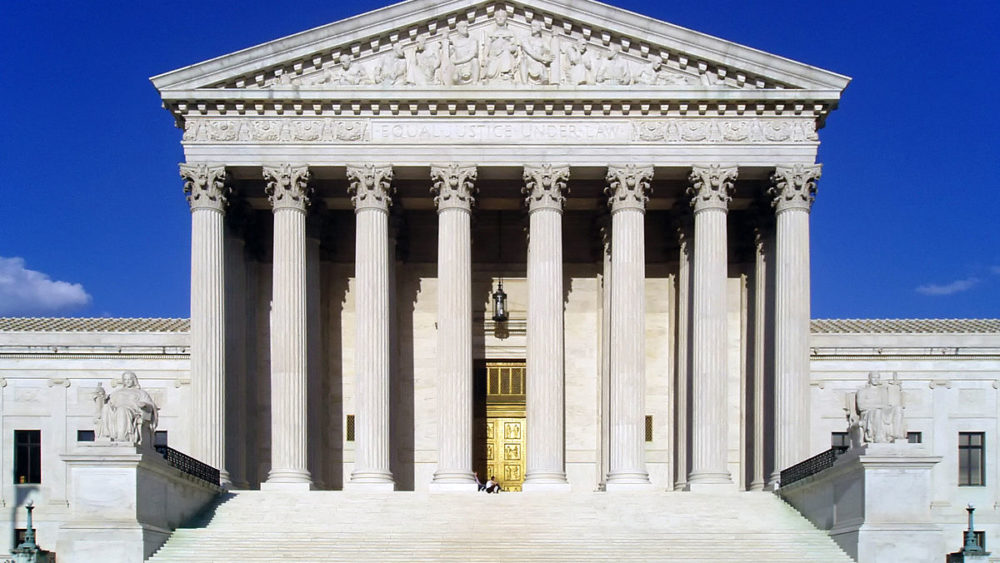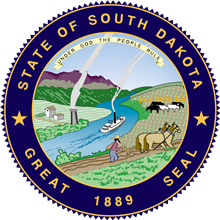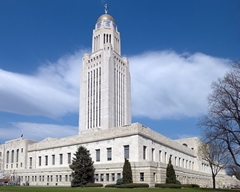
United States Supreme Court Building
The U.S. Supreme Court on Monday declined to take up a case challenging a Montana disclosure law. Specifically, the law requires disclosure of spending for political ads within 60 days of an election. In August 2019, the 9th U.S Circuit […]
The U.S. Supreme Court on Monday declined to take up a case challenging a Montana disclosure law.
Specifically, the law requires disclosure of spending for political ads within 60 days of an election.
In August 2019, the 9th U.S Circuit Court of Appeals upheld Montana’s law requiring nonprofit groups running ads mentioning candidates, political parties or ballot issues in the 60 day window before an election to report any spending of $250 or more and disclose who funded their efforts.
This law is part of the state’s Disclosure Act, while the case was filed by the National Association of Gun Rights in 2016.
In their lawsuit, the group stated they were planning on sending mailers in Montana.
However, they would not report their donors or spending because it violated their constitutional rights of free speech.
September 19, 2018 •
U.S. Court of Appeals Upholds IL Contribution Limits
The U.S. Seventh Circuit Court of Appeals upheld the Illinois Disclosure and Regulation of Campaign Contributions and Expenditures Act. In 2012, Liberty PAC filed a lawsuit claiming the Illinois campaign finance law violates the First Amendment by restricting contributions from […]
 The U.S. Seventh Circuit Court of Appeals upheld the Illinois Disclosure and Regulation of Campaign Contributions and Expenditures Act.
The U.S. Seventh Circuit Court of Appeals upheld the Illinois Disclosure and Regulation of Campaign Contributions and Expenditures Act.
In 2012, Liberty PAC filed a lawsuit claiming the Illinois campaign finance law violates the First Amendment by restricting contributions from individual donors, allowing political parties to make unlimited donations during a general election, creating a waiver provision that lifts spending limits, and allowing unlimited contributions from legislative caucus committees.
The U.S. District Court dismissed the first three claims at the pleadings stage due to precedent and conducted a bench trial on the fourth issue and ruled for the state.
The U.S. Circuit Court panel affirmed the lower court’s decision in its entirety and the plaintiffs intend to appeal the decision to the U.S. Supreme Court.
September 18, 2018 •
South Dakota Holds Special Session
The South Dakota Legislature held a one-day special session on September 12 addressing online sales tax measures. The initial law to collect sales tax from online retailers was passed in 2016, but it was challenged and taken all the way […]
 The South Dakota Legislature held a one-day special session on September 12 addressing online sales tax measures.
The South Dakota Legislature held a one-day special session on September 12 addressing online sales tax measures.
The initial law to collect sales tax from online retailers was passed in 2016, but it was challenged and taken all the way to the U.S. Supreme Court.
This special session was to set an effective date for the law to go into effect.
August 21, 2018 •
Montana Contribution Limits Head to U.S. Supreme Court
Attorney James Bopp, Jr. has asked the U.S. Supreme Court to strike down Montana’s contribution limits, arguing they are an unconstitutional limit on free speech. Bopp was an attorney in the well-known Citizens United case, which led to the U.S. […]
 Attorney James Bopp, Jr. has asked the U.S. Supreme Court to strike down Montana’s contribution limits, arguing they are an unconstitutional limit on free speech.
Attorney James Bopp, Jr. has asked the U.S. Supreme Court to strike down Montana’s contribution limits, arguing they are an unconstitutional limit on free speech.
Bopp was an attorney in the well-known Citizens United case, which led to the U.S. Supreme Court ruling corporations cannot be prohibited from spending on elections.
Montana’s limits were struck down in 2012 and again in 2015, but the 9th U.S. Circuit Court of Appeals ruled last October the limits are constitutional.
The U.S. Supreme Court has not yet said if it will take up the case.
The Legislature’s Tax Rate Review Committee decided no special session is needed to change the income and sales tax rates. The committee noted the state’s revenue growth for the fiscal year that ended June 30 was higher than projected, but […]
 The Legislature’s Tax Rate Review Committee decided no special session is needed to change the income and sales tax rates.
The Legislature’s Tax Rate Review Committee decided no special session is needed to change the income and sales tax rates.
The committee noted the state’s revenue growth for the fiscal year that ended June 30 was higher than projected, but sales tax revenue is lower than projected forecasts.
The committee is looking into the recent U.S. Supreme Court ruling that allows states to collect sales taxes from online purchases and to determine if legislation is required.
June 9, 2017 •
North Carolina Lawmakers Reject Call for Special Session
On June 8, North Carolina lawmakers voted to reject Gov. Roy Cooper’s call for a special concurrent session to redraw district voting maps. Lawmakers accuse Cooper of overstepping his constitutional authority to call special sessions in extraordinary circumstances in this […]
 On June 8, North Carolina lawmakers voted to reject Gov. Roy Cooper’s call for a special concurrent session to redraw district voting maps.
On June 8, North Carolina lawmakers voted to reject Gov. Roy Cooper’s call for a special concurrent session to redraw district voting maps.
Lawmakers accuse Cooper of overstepping his constitutional authority to call special sessions in extraordinary circumstances in this case because the General Assembly is already in session.
The rejected special session comes after the U.S. Supreme Court ruled 28 districts unconstitutional due to racial gerrymandering.
Legislative leaders indicated they plan to wait for instructions from the courts before redrawing district maps.
February 27, 2017 •
Supreme Court Affirms, Without Written Opinion, Lower Court’s Ruling Regarding Campaign Finance Disclosure
Today, the United States Supreme Court affirmed electioneering communication disclosure requirements under the Bipartisan Campaign Reform Act (BCRA). In Independence Institute v. FEC, the Supreme Court affirmed, without a written opinion, a lower court’s summary judgement against Independence Institute, a […]
 Today, the United States Supreme Court affirmed electioneering communication disclosure requirements under the Bipartisan Campaign Reform Act (BCRA).
Today, the United States Supreme Court affirmed electioneering communication disclosure requirements under the Bipartisan Campaign Reform Act (BCRA).
In Independence Institute v. FEC, the Supreme Court affirmed, without a written opinion, a lower court’s summary judgement against Independence Institute, a Colorado based 501(c)(3) tax-exempt organization. Independence Institute argued the BCRA’s disclosure requirements for electioneering communications were overbroad and violated the First Amendment.
Electioneering communication is defined as any broadcast, cable, or satellite communication referring to a clearly identified federal candidate, made within 30 days of a primary election or 60 days of a general, special, or runoff election, and targeted to the relevant electorate.
On November 3, 2016, the U.S. District Court for the District of Columbia had rejected the Independence Institute’s challenge to the BCRA’s electioneering communication provisions and granted the Federal Election Commission’s motion for summary judgment.
January 11, 2017 •
Supreme Court Issues Stay on Special Elections in North Carolina
Yesterday, the U.S Supreme Court issued a temporary stay on a lower court order to hold special elections in November 2017 for North Carolina General Assembly seats in unconstitutionally gerrymandered districts. The temporary stay of the lower court’s decision will […]
 Yesterday, the U.S Supreme Court issued a temporary stay on a lower court order to hold special elections in November 2017 for North Carolina General Assembly seats in unconstitutionally gerrymandered districts.
Yesterday, the U.S Supreme Court issued a temporary stay on a lower court order to hold special elections in November 2017 for North Carolina General Assembly seats in unconstitutionally gerrymandered districts.
The temporary stay of the lower court’s decision will remain in place until the justices decide whether to consider a previously filed appeal from state officials. If the Supreme Court hears the case and overturns the ruling, the special elections would be canceled and current districts restored for the 2018 election.
State and Federal Communications, Inc. provides research and consulting services for government relations professionals on lobbying laws, procurement lobbying laws, political contribution laws in the United States and Canada. Learn more by visiting stateandfed.com.

